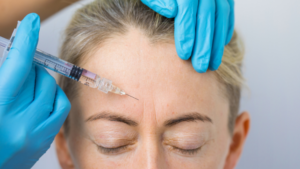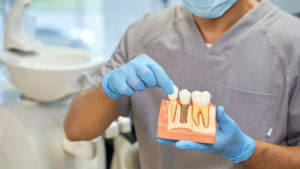Even before your baby’s teeth come through, there are still things that you can be doing to keep their mouth healthy.
Baby oral healthcare should start as soon as your child is born.
Fortunately the steps to doing this are incredibly simple.
All it takes is twice daily cleaning of your baby’s mouth and feeding them a drink with as little sugar as possible.
Here’s how to do this in a little more detail:
Why is it important to clean my baby’s mouth?
Even before your baby’s teeth come out you need to clean their mouth twice a day.
Ideally you would do this once in the morning and once before bed.
This is because mouths are superb breeding grounds for bacteria (warm and wet).
Add to this sugary milk residue, soft tender gum tissue, and a still-developing immune system, and you have one of the most ripe-for-infection zones that nature can offer.
Even before any teeth come out, there are certain oral health problems that babies are susceptible to.
These are: oral thrush and recurrent mouth ulcers (canker sores).
The risk of your baby developing both these problems can be reduced by cleaning their mouths regularly.
Another (more important, I would argue) effect of cleaning your baby’s mouth out twice daily is the habituating effect that it has on both you and your baby.
The ritual of cleaning your baby’s mouth twice daily will get you (the parent) to automatically do this every day.
This will inevitably (read: with no extra thought or effort on your part) lead to you brushing their teeth twice daily when your child’s teeth eventually do come out.
For your baby, it will get them used to the routine.
At the end of the day, good oral hygiene is about habit and mindset.
How do I clean my baby’s gums?
You should clean your baby’s gums by gently massaging them with some damp gauze or a clean, damp cloth.
Ideally you should wrap your index finger in the gauze or cloth so you can clean each portion of the gum individually.
Using cold water when doing this is also an effective way of managing the pain of teething.
Two birds killed with one soft, damp stone.
You can also buy “baby brushes”, which have rubber bristles that you wear on your finger.

These brushes are used just as you would with the gauze or cloth.
Simply massage the gums gently and thoroughly, going over each portion of gum individually, as you would if teeth were present.
Both types of cleaning are equally as effective, so play around with them and see which type your baby takes to more (remember we want to get your baby to come to enjoy the ritual of cleaning).
Aim to do this twice a day, once after first feed for the day and once before bed.
These are the best times to clean your baby’s mouth because harmful bacteria rely on sugar to survive.
Therefore, cleaning straight after feeding, as well as after their final feeding of the day, should (as far as is possible) starve harmful bacteria of sugar, therefore reducing their ability to multiply.
How to feed your baby in order to promote their oral health.
Your baby’s drinking habits also hugely affects their oral health, perhaps more so than cleaning.
In particular, you need to closely monitor what your baby drinks, as well as when they drink and how they drink.
What your baby drinks
The best way to feed your baby to support their oral health is to feed them breast milk only.
Unfortunately, feeding your infant baby formula, rather than breast milk, can significantly increase their chances of developing oral health problems.
This is simply because baby formula usually contains a lot more sugar than breast milk.
Now, breast milk is not sugar free.
In fact, on average, breast milk contains 7% sugar.
Baby formula on the other hand can contain up to 40% sugar.
Although this sugar comes in the form of lactose, which is in itself not harmful to teeth, when it remains in the mouth as a sticky residue your saliva will break it down into sucrose.
This is the type of sugar that feeds the harmful bacteria in your mouth.
We understand that not everyone can breast feed.
This means that if you are going to feed your child formula, make sure to look for a product that contains less than 10% sugar.
This, combined with twice daily cleaning, should help eliminate any damage done to your baby’s gums by sugar.
How your baby drinks
Studies by the American Dental Association indicate that babies who are breastfed are less likely to develop teeth alignment issues such as over-bites or open bites compared to those who are bottle-fed.
The theory behind this is that regular pressure against the teat of a baby’s bottle can interfere with the growth of your child’s jaw.
Yet again, this means that breastfeeding is a superior option to bottle-feeding a child during the first six months of their life.
If you still want to bottle feed your child, make sure to use a bottle with a teat that best mimics the shape of a nipple so as to minimise interference with the development of their jaw.
An example of a bottle-teat that does this really well is NUK.

As time goes on, you really want to start moving your child away from using a bottle, and towards using a cup (starting with free-flow trainer cup).
This transition should start as their first teeth begin to come out.
Managing oral health problems in babies.
There are two very common oral health problems in babies…well three if you include teething, but let’s cover that later.
Anyway, these two problems are: recurrent mouth ulcers and oral thrush.
Recurrent mouth ulcers
In babies, recurrent mouth ulcers are caused by cuts or burns to the mouth.
These become problematic if they take a long time to heal, as the pain they cause can lead to irritability and an aversion to eating.
The pain caused by ulcers, and the length they take to heal is directly affected by the cleanliness of your baby’s mouth.
Simply put, poor oral hygiene will increase the pain that mouth ulcers cause to your child (as they are more likely to become infected) and will make them take longer to heal (again because of the likelihood of infection).
Therefore, there are two simple ways to drastically reduce your baby’s chances of getting mouth ulcers.
These are:
- Look out for what your baby puts into their mouth (including fingers). Anything roughly textured, overly hard, or potentially sharp (such as fingernails…its almost always fingernails that cause mouth ulcers in babies) can cause the cut to the palate that leads to mouth ulcers.
- Keep the good oral hygiene outlined here (proper cleaning and feeding) so chances of infection is kept to a minimum.
Oral thrush
Oral thrush is a fungal infection caused by the Candida fungus.
Candida naturally occurs in the body, but can multiply to unnatural levels in certain situations.
The most common contributing factors to thrush of any kind are: a compromised immune system and high sugar levels in the affected area.
Oral thrush in babies usually manifests itself as a white fur or film that covers your baby’s tongue or other parts of the inside of their mouth.

It can cause irritation (read: crying), an aversion to feeding, and a propensity to put their hands in their mouth (even more so than usual!).
It does not cause any more serious or long term harm other than these factors, although it can spread to your breast if you are breastfeeding, and that can be incredibly uncomfortable and make feeding even harder.
Oral thrush can be treated quite easily using an anti-fungal cream applied to the affected areas. You can get these over the counter or on prescription (for more persistent cases).
Other swallowed medications also work but you will need to ask your GP if they are appropriate for your baby.
In terms of reducing your baby’s chances of developing oral thrush, it really comes down to their sugar intake and how much sugar is consistently in their mouth.
As I said, the Candida fungus thrives off sugar.
Therefore a sugary environment, and high blood sugar levels in general, will increase the chances of this fungal infection multiplying beyond control.
Therefore regular cleaning of the mouth will minimise your baby’s chances of developing oral thrush.
That being said, genetic factors, such as how your baby’s immune system develops in their early months is still the biggest predictor of them developing oral thrush, so don’t beat yourself up if they get it. So long as you are following the steps I’ve outlined above you are doing everything you can to prevent it.




